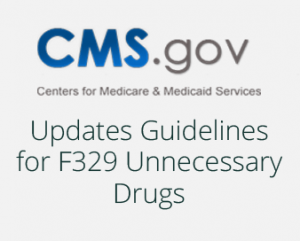[mk_page_section layout_structure=”full” attachment=”scroll” bg_position=”left top” bg_repeat=”repeat” bg_stretch=”false” parallax=”false” parallax_direction=”vertical” bg_video=”no” expandable=”false” mask=”false” mask_opacity=”0.6″ expandable_icon=”mk-theme-icon-plus” expandable_icon_size=”16″ expandable_txt_align=”left” expandable_txt_size=”16″ padding=”20″ full_height=”false” full_width=”false” intro_effect=”false” el_class=”justify-content”][vc_column width=”1/1″][mk_padding_divider size=”25″][mk_fancy_title style=”simple” corner_style=”pointed” tag_name=”h3″ border_width=”3″ size=”26″ line_height=”24″ color=”#393836″ font_weight=”600″ text_transform=”capitalize” letter_spacing=”0″ font_family=”Roboto” font_type=”google” margin_top=”10″ margin_bottom=”10″ align=”center” responsive_align=”center”]CMS Updates Guidelines for F329 Unnecessary Drugs[/mk_fancy_title][mk_padding_divider size=”25″][vc_row_inner][vc_column_inner width=”1/1″][vc_column_text responsive_align=”left” el_class=”justify-content”]
 The Centers for Medicare and Medicaid Services (CMS) recently issued additional regulatory guidelines for F329 Unnecessary Drugs, with a special focus on use of antipsychotic medications for residents diagnosed with behavioral or psychological symptoms of dementia. The CMS release advises that all antipsychotic medications carry Food and Drug Administration Black Box Warnings. These warnings caution that both conventional and atypical antipsychotics are associated with an increased risk of serious or life-threatening adverse effects for elders being treated for dementia-related psychosis. Your consultant pharmacist is a primary source of information about the impact of all medications on residents who are diagnosed with dementia. His or her critical thinking skills provide better understanding of reasons for using or gradually reducing medications in this class of drugs. By working together with the physician and nursing staff, the consultant pharmacist helps ensure that treatment occurs at the lowest possible dose required to improve the target symptoms.
The Centers for Medicare and Medicaid Services (CMS) recently issued additional regulatory guidelines for F329 Unnecessary Drugs, with a special focus on use of antipsychotic medications for residents diagnosed with behavioral or psychological symptoms of dementia. The CMS release advises that all antipsychotic medications carry Food and Drug Administration Black Box Warnings. These warnings caution that both conventional and atypical antipsychotics are associated with an increased risk of serious or life-threatening adverse effects for elders being treated for dementia-related psychosis. Your consultant pharmacist is a primary source of information about the impact of all medications on residents who are diagnosed with dementia. His or her critical thinking skills provide better understanding of reasons for using or gradually reducing medications in this class of drugs. By working together with the physician and nursing staff, the consultant pharmacist helps ensure that treatment occurs at the lowest possible dose required to improve the target symptoms.
When considering an antipsychotic medication for an elderly resident with dementia, CMS expects facility staff to first identify and address medical, physical, functional, psychological, emotional, psychiatric, social, and environmental causes of behaviors.
[/vc_column_text][/vc_column_inner][/vc_row_inner][vc_row_inner][vc_column_inner width=”1/1″][mk_fancy_title style=”simple” corner_style=”pointed” tag_name=”h3″ border_width=”3″ size=”20″ line_height=”24″ color=”#393836″ font_weight=”600″ text_transform=”capitalize” letter_spacing=”0″ font_family=”Roboto” font_type=”google” margin_top=”10″ margin_bottom=”10″ align=”left” responsive_align=”center”]Antipsychotic medications should not be used for persons with dementia if the only indication for use is one or more of the following:[/mk_fancy_title][mk_custom_list margin_bottom=”30″]
- Wandering
- Poor self-care
- Restlessness
- Impaired memory
- Mild anxiety
- Insomnia
- Inattention or indifference to surroundings
- Sadness or crying alone that is not related to depression or other psychiatric disorders
- Fidgeting
- Nervousness
- Uncooperativeness such as refusal or difficulty receiving care
[/mk_custom_list][vc_column_text responsive_align=”center” el_class=”justify-content”]When the preceding indications are present in combination with the following criteria, CMS states a resident with dementia may be appropriate for the use of an antipsychotic medication:[/vc_column_text][mk_custom_list margin_bottom=”30″]
- Behavioral symptoms present a danger to the resident and others.
[/mk_custom_list][vc_column_text responsive_align=”center” el_class=”justify-content”]AND one OR both of the following are present:[/vc_column_text][mk_custom_list margin_bottom=”30″]
- Symptoms are identified as being due to mania or psychosis.
[/mk_custom_list][vc_column_text responsive_align=”center” el_class=”justify-content”]AND/OR[/vc_column_text][mk_custom_list margin_bottom=”30″]
- Behavioral interventions have been attempted and included in the plan of care, except in an emergency.
[/mk_custom_list][vc_column_text responsive_align=”center” el_class=”justify-content”]The new CMS guidance also addresses acute situations/emergencies and enduring conditions.
Because prescribing decisions are based on a number of complex factors, CMS advises surveyors to speak with the consultant pharmacist and/or the prescriber when reviewing antipsychotic medication use for elderly residents with dementia. Staff will be expected to know the rationale for using an antipsychotic, for adding any other psychopharmacological medications, or for changing from one antipsychotic to another agent. Inability to answer these questions may result in a surveyor citing the medications as unnecessary drugs.
Involve the Quality Assessment and Assurance Committee in monitoring residents receiving antipsychotic medications and in assuring that appropriate responses are made to issues and concerns identified through the consultant pharmacist’s monthly medication regimen reviews. When monitoring residents who receive antipsychotics, evaluate the ongoing effectiveness and observe for the following potential adverse consequences:[/vc_column_text][mk_custom_list margin_bottom=”30″]
- General – anticholinergic effects, falls, excessive sedations
- Cardiovascular – cardiac arrhythmias, orthostatic hypotension
- Metabolic – increase in total cholesterol and triglycerides, unstable or poorly controlled blood sugar, weight gain
- Neurologic – akathisia, neuroleptic malignant syndrome, Parkinsonism, tardive dyskinesia, cerebrovascular events (strokes or transient ischemic attacks.)
[/mk_custom_list][vc_column_text responsive_align=”center” el_class=”justify-content”]Act immediately if these negative outcomes are thought to be caused by an antipsychotic medication. Contact your consultant pharmacist and request a STAT medication review to determine if these consequences are possibly related to the resident’s medications. CMS will expect a full investigation with immediacy of correction. Documentation from nurses and the physician with consultant pharmacist recommendations must be thorough and timely in these cases.
To review the CMS updates to F329 Unnecessary Drugs and to F309 Quality of Care in their entirety, visit:
https://www.cms.gov/Medicare/Provider-Enrollment-and-Certification/SurveyCertificationGenInfo/Downloads/Survey-and-Cert-Letter-13-35.pdf . Your consultant pharmacist is equipped to assist your facility with interpretation and application of this new CMS information.
Sincerely,
Saul Greenberger, Founder
888-319-1818
www.PharmScript.com[/vc_column_text][/vc_column_inner][/vc_row_inner][/vc_column][/mk_page_section]
